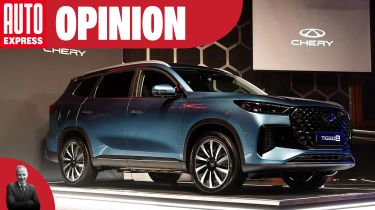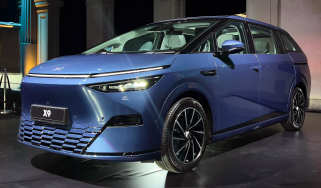European cars must be cheaper or China’s Chery will eat them for breakfast
Editor-at-large Phil McNamara thinks Europe’s car makers must double down on restoring affordability

Have I seen the future? Chinese car brand Chery launched at London’s O2 arena, with a public advertising blitz outside as some 400 media and retailers watched the show. The spectacle looked slick but random: street dancers, an orchestra playing nineties house music. The comms felt clunky: a Chinese brand history lesson, powertrain technical detail that had most attendees glazing over and one exec referring to the screen behind while asking us to “see the photo of my backside”.
Regardless, the intent was clear. Streaked by red lasers on the stage, the Chery Tiggo 7 and Tiggo 8 launch models loomed over proceedings, while next year’s entrants – the compact Tiggo 4 and flagship Tiggo 9 – stood in the wings. Four SUVs, from compact to large in size, from £20k to £40k in price, poised to storm the UK market in the next nine months.
I spoke to UK CEO Gary Lan and he skewered legacy car brands in one soundbite. “Ten years ago, one million [UK cars were registered] in the £20-30,000 price range. Today that’s shrunk dramatically. There’s an opportunity for us to provide a good car with technology for people in that price range.”
Europe’s makers may excuse this, citing energy price inflation, supply chain shocks, costly regulation and tariffs, but prices rose as Covid squeezed supply and they must restore affordability. Because Chery is coming at them hard.
It reckons the Volkswagen Tiguan-sized Tiggo 7 will be the UK’s cheapest PHEV at £29,995, and the Tiggo 8 will be the most affordable seven-seat SUV at £28,545. The Dacia Jogger is far cheaper, but the Skoda Kodiaq – £10k more – looks exposed.
Reviews of SUVs from Chery sister brands Omoda and Jaecoo cite coarse petrol engines, hesitant gearboxes and lumpy chassis. But similar was true of Korean cars initially, and the industry has coined the phrase “China speed”, noting how fast improvements are introduced.
BYD, Omoda and Jaecoo sold 40,000 UK cars in the first seven months of the year. And buyers who could otherwise be priced out of the new-car market might fancy a big Chery SUV loaded with kit at affordable prices. All this is no premonition – just automotive’s new world order.
Thinking of getting a Chinese car? You can get your hands on a new Omoda 5 from just £22,000 through our Buy a Car service, or alternatively a new Jaecoo 7 is available from just £28,000.



